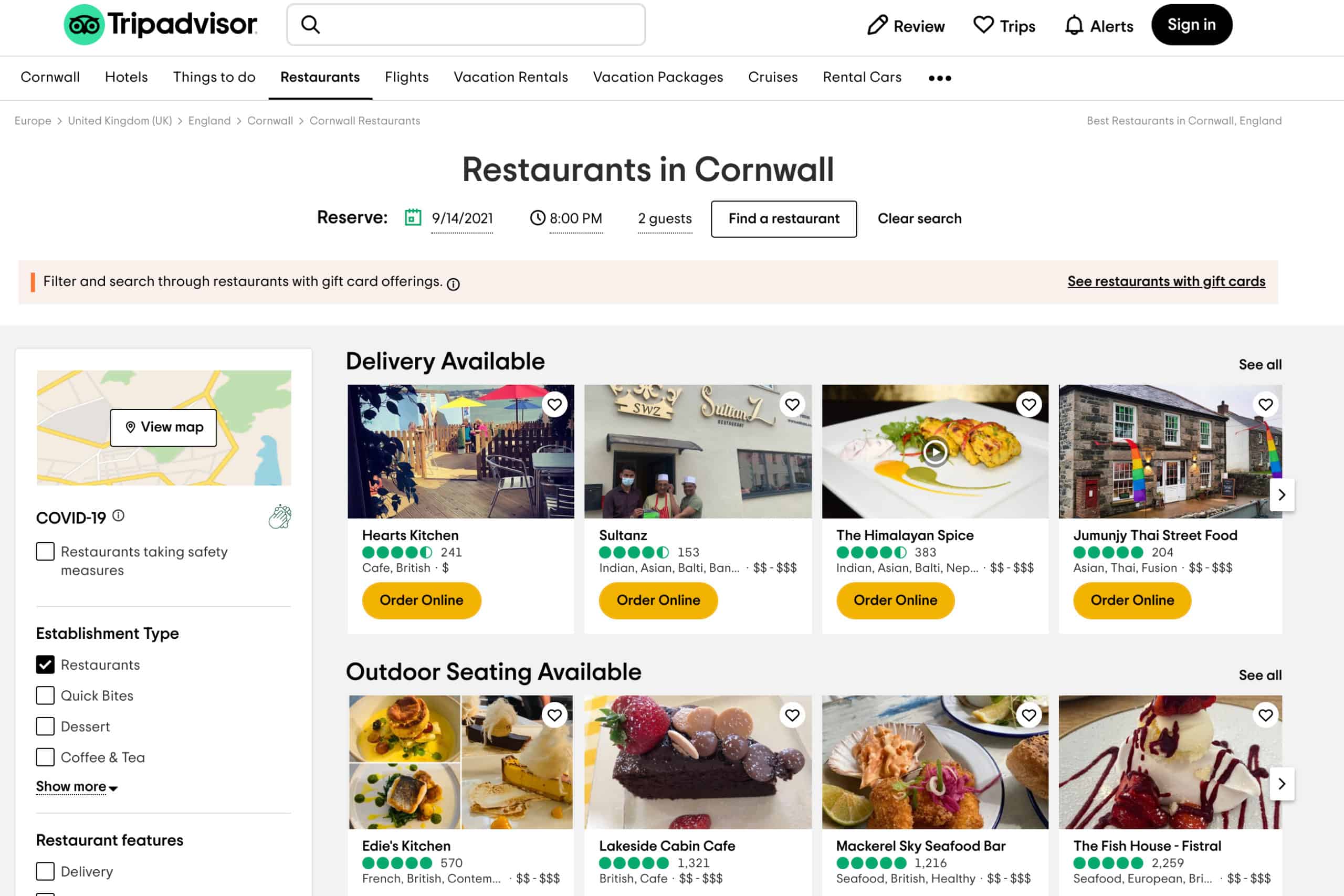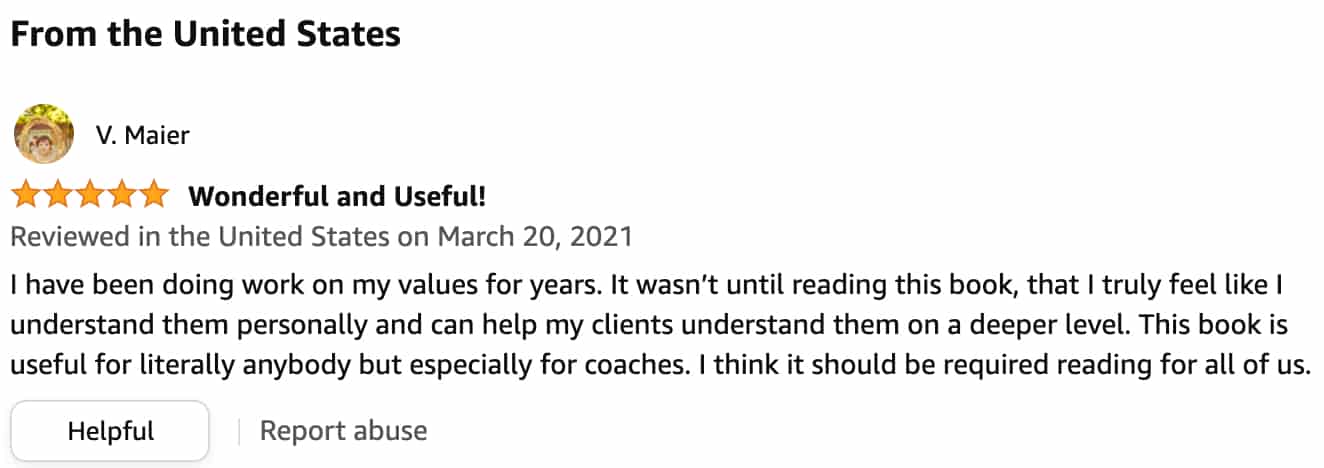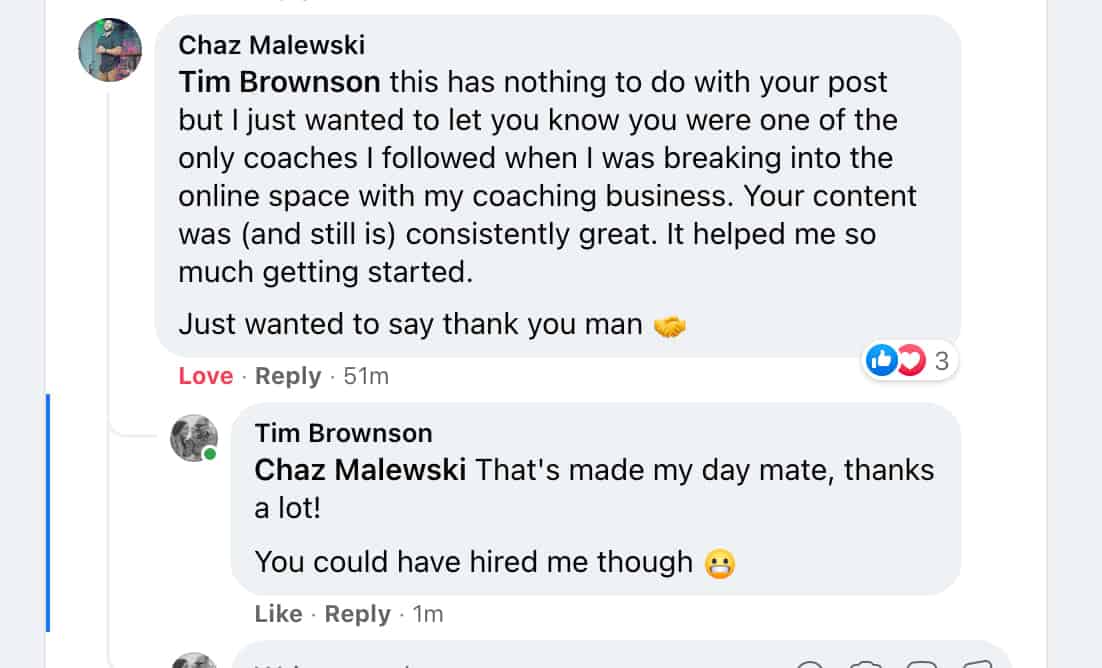Imagine you’re visiting a new town and you fancy something to eat.
There are two restaurants serving the kind of food you enjoy, one is almost full whereas the other is almost empty.
Which will you choose?
Almost certainly the first one even though you have no way of knowing what the food is like.
You will presume that because it’s busier it must be better.
That’s the power of social proof.
Yet it’s only one form of social proof and there are others, three of which we’re going to look at in this post.
But before we do, let’s understand why we are influenced by social proof and why it’s important for you as a coach.
Hint: It allows you to build trust in people who don’t even know you.
The 4 Types of Social Proof

Why Are We Influenced By Social Proof?
Your brain consumes between 20% and 25% of your daily energy supply every day.
It’s highly efficient at the unconscious level where it tends to do most of the important shit like breathing, beating your heart, maintaining your blood pressure etc.
But it burns through energy like a monkey driving a Hummer towing another Hummer across a swamp when working at the conscious level.
If you were to start a new job you would probably come home exhausted after the first day. Even if you didn’t do a fat lot.
Meeting new people, learning new systems and even finding your way to the bathroom will all require conscious effort because you’re using your working memory.
In time these things will get transferred to your long term memory. And when that happens you will need very little effort to recall names.
The computer system will be a breeze and you can find the bathroom half asleep before your first coffee of the day.
To conserve energy your brain is always looking to do as much as it can at the unconscious level.
One way it does this is to use heuristics which are shortcuts in our thinking.
Social proof, a phrase coined by Robert Cialdini in his brilliant and seminal book, Influence from 1984, is one heuristic that allows you to make decisions more quickly and more easily.
Note: If you want to check out the other 11 books I suggest all coaches read along with Influence, check out 15 Marketing Books Coaches Should Read (If they want to succeed)
It doesn’t mean you will necessarily make better decisions, but they will feel safer and seem more rational.
Seeing a full restaurant next to an empty one suggests that the people in the busy restaurant must know the other is not as good.
The reality is, that may well not be the case.
It could be that the busy eatery is brilliant at marketing crap food like McDonald’s is.
Or they had a party booked in because they were the only local place that took large groups.
Or perhaps it was a meeting of the ‘We love lettuce Society’ and that restaurant carried an extensive selection of fine lactuca sativa.
The quality of the food is only one explanation for a busy restaurant.
But your brain was keen to believe that one because it could slip back into cruise control and preserve energy.
That’s the reason why social proof is so powerful, so let’s look at some examples.

1. The Wisdom of the Crowd
I once went skiing with three friends to Sol in Austria.
We had dreadful snow conditions with more grass visible than the powdery stuff.
We got the opportunity to go on a trip to a nearby resort that had glacier skiing.
As the snow on glaciers never melts and you’re guaranteed to get good skiing conditions, so we jumped at the chance.
When we got there we noticed two lifts to the top.
One had a huge queue and the other had no queue at all.
The one with no queue was an open chair lift with the other being an enclosed bubble type lift.
All four of us agreed that it was worth getting a bit cold to avoid hanging around for half an hour. So we jumped on the open lift.
Big mistake.
We had to go through the cloud line and there was a fucking blizzard going on and it was bitterly cold!
How cold was it?
The moustache of the friend who was sat next to me froze solid
That is an example of when we should have followed the wisdom of the crowd.
But the crowd isn’t always right.
McDonald’s has sold over 300 billion burgers and a staggering 4 trillion individual french fries.
That’s enough to take you to Jupiter and back twice.
Note: Don’t bother trying this to see if it’s true, I did, and it took me three months just to get to France when I gave up.
In this case, the wisdom of the crowd suggests McDonald’s must make the greatest burgers and fries ever known to humankind, right?
Uh-huh, and hungry foxes must make great babysitters for sleepy chickens.
From a marketing perspective, however, it really doesn’t matter whether the crowd is always right or not because your brain will always feel more relaxed following it.
Consequently, you should be using this method of social proof whenever you can.
It’s not easy at the start of your coaching journey because you need to build a following, but if you have a marketing strategy in place, then that will come.
There are over 6,500 coaches in the Coach the Life Coach Facebook Group – click here to join.
And there are almost 4,500 coaches on my newsletter list – you can sign up at the top of this page and get my free guide 7 Steps to Building a Successful Coaching Practice.
Why do I regularly share those numbers as well as the fact that I built my first newsletter list to over 10k?
Well, you know by now, it’s to build credibility using the wisdom of the crowd.
Any coach who has managed to get 100 people on her newsletter list knows how hard it is.
Likewise, building a Facebook group takes patience, persistence and an understanding of social media.
So I must be doing something right, right?
There is also something called the wisdom of friends.
It works in pretty much the same way as the wisdom of the crowd, but we are even more influenced by our family and friends than we are people we don’t know.
That is why kids are more likely to have the same political leanings, support the same sports teams and have the same religious beliefs as their parents and family.

2. User Social Proof (Referrals, Reviews & Testimonials)
Referrals are the Holy Grail for any coach who wants to be successful.
Referrals are clients waiting to happen.
Imagine you’re back in the same town wondering what to eat again.
This time both restaurants are equally busy and the menus are equally tempting.
The owner of one restaurant comes out as you’re looking at her menu and starts to tell you how amazing her chef is and how great the food he prepares is.
As she goes back inside a couple walks out of the other restaurant.
They see you looking at the menu and point back to the one they just left and say ‘You really should eat there. We just had an incredible meal, the best in years’
Where are you going to eat this time?
In all likelihood, you will take their advice because you will presume it to be honest and unbiased even though you don’t know these people.
They could be the owners, playing a prank, or just having crap taste in food because they usually eat at McDonald’s (there’s a bit of a theme here).
You won’t even consider those options because your brain has already decided where it wants to eat.
Every coach who is coming to an end with a happy client should be asking that client ‘do you know any other people who would benefit from my coaching in the way you have?’
It’s not rude and it’s not putting them on the spot.
What you’re doing is giving them the opportunity to help you because you helped them.
A step down from referrals are testimonials and reviews.
Reviews on sites like Trip Advisor and Yelp are the lifeblood of the hospitality industry, but they can be equally beneficial if used correctly.
I went to The Clarity Method US Amazon book page the other day for the first time since I left the country last year and saw a lovely review, so I posted it to the Coach the Life Coach Facebook Group.

And then a day or so later I was in another Facebook group for coaches and saw this comment on a post I made.

I shared that too.
Unsolicited feedback like that is very valuable for building social proof and you must share it.
It’s not bragging or being self-indulgent, it’s ethical marketing.
Testimonials are slightly different to reviews because they will only tend to live on your website, or maybe on a social media profile.
Unlike reviews, they aren’t very effective if they’re anonymous or only have a first name.
Similarly, they’re not very powerful without a picture of the person.
And being too long or too vague can reduce their efficacy too.
Video testimonials are the best to have which is why I have a bunch on this page.
Testimonials help clients mitigate the risk of hiring you and gives them comfort knowing others in a similar situation have gone before them.
You can also mix these up.
I’ve frequently put potential clients in touch with people who have given me testimonials.
In that respect, a testimonial turns into a referral and is very powerful.
3. Celebrity Social Proof
If you’re a fan of all-time great basketball player LeBron James you may well wear the same shoes he uses if you can afford them.
That’s not unreasonable, he’s an expert on basketball and they will no doubt be good.
But what the fuck does LeBron know about insurance?
Or doughnuts?
Or even burgers?
The answer is probably no more than you.
So deciding to use All State Insurance, eat Dunkin’ Donuts, or buy crap McDonald’s (I told you there was a theme) for lunch because he endorses them makes no sense.
You’re probably now thinking that you wouldn’t be influenced in such a manner by somebody’s celebrity status when they are away from their field of expertise.
But you would because we all are.
Maybe not that specific example/person but advertisers spend billions on hiring celebrities because they work.
And sadly, it’s why (often) talentless influencers on social media can earn big bucks
It’s why if you were standing outside our restaurants debating yet again and Barack Obama walked out of one of the restaurants you will probably decide to eat there.
Because ya know, it’s Barack Obama.
It’s tricky getting a celebrity to endorse you, but it can be done with sites like Cameo.
For $375 you can have Don Trump Jnr record a video for you to use.
You’d immediately wipe out 60% or more of your potential clients who think he’s an utter tool, but Trump supporters would lap it up.
Most coaches can’t afford to pay for celebrity promotions and whilst fun, they are a bit gimmicky.
Worry not though, because you don’t need household names to get the celebrity effect.
Industry leaders, published authors and coaches with huge followings can have the same effect.
If you follow industry influencers on social media (and you should) share their stuff that you think will help others.
Add comments that provide value and encourage conversations.
And promote their products to your friends and connections if you think they can benefit.
Get on their radar in a good way and in time you can ask for that book endorsement or retweet.

4. Expert Social Proof
I’ve had a persistent tickly cough for a couple of years that has got worse over the last few months.
I’m a raging hypochondriac and presumed that it was cancer and I was dying.
The fact that there is no history of cancer in my family and I’ve never been a smoker didn’t seem to have me doubting my imminent demise.
All my friends kept telling me it wasn’t cancer and I wasn’t dying.
My wife who was specialised in head and neck oncology for over 12 years examined me (twice) and assured me it wasn’t cancer and I wasn’t dying.
And my own doctor told me it wasn’t cancer and I wasn’t dying.
I didn’t believe any of them so as the waiting time was several months, I paid to go privately to see an ENT specialist and get a nasal endoscopy.
Apparently, I don’t have cancer and I’m not dying.
It’s got more to do with drinking way too much coffee, not enough water and some acid reflux.
I believed the ENT guy because he’s the expert.
My wife is an expert too, but she couldn’t scope me and none of us listens to our partners when it comes to such things, do we?
We listen to independent experts (or people we perceive as being experts) and we trust them.
We do this to such an extent that if you throw a white coat on an actor and put a stethoscope around her neck she will then be seen as more trustworthy in a TV ad.
For the final time (I promise) you’re pondering where to eat in the strange town when the owner of the restaurant comes out again.
She tells you the same story, but this time she pulls out a magazine for you to look at.
In it is an article written by Gordan Ramsey extolling the virtues of this restaurant after stopping to eat there whilst on vacation.
Now where will you eat, because you have just been hit by celebrity and expert proof at the same time?
It’s why an Indian restaurant local to us called Spice Sea exploded with business and we couldn’t get in after Gordon fucking Ramsay raved about it on social media recently.
This is why adverts tell you things like 90% of dentists recommend a certain toothpaste.
And why super successful sportspeople get massive sponsorship deals for clothing and equipment.
A Word of Warning
A lot of people fake social proof.
They buy followers, concoct testimonials and use the ‘As featured in…‘ option on their website even when it has nothing to do with their work as a coach.
It’s dishonest, unethical and people like me who understand how this all works will find you out.
I’ve been on a bunch of TV programmes in the UK, but none had anything to do with what I do now.
So me saying ‘As featured on the BBC’ may not be technically lying, but it would be deliberately misleading people.
You’re better than that.
Please do leave me a comment on your thoughts about using social proof.



Great article, relevant and direct with easy to understand frames of reference.
Building trust is an ongoing and lifelong process.
There is a simple way to build more trust, deliver solutions to common challenges people face.
And always tell the truth.
That way you never have to remember what you said.
Tim tells it like it is. Starting an online coaching business is really fucking hard.
There are no quick fixes. Never believe the next silver bullet or snake oil salesman.
And get your own coach, I have 2 right now.
You have two coaches and neither of them is me!
Excellent article – as always. To add on to what the other coach said above, you are the only coach I am subscribed to, and one of the few newsletters I actually read every time you publish. There are two main reasons I prioritize your writings: first because I ALWAYS learn something valuable from your content – there’s no bullshit, no hype, you’re genuine, and give solid good advice. Secondly, you’re a great writer, and your articles are fun to read – while laughing I’m learning – you can’t beat that. I really appreciate how much you share and how genuine you are!
Thanks so much Meredith, I’m blushing now.
I’m not really, I’m actually thinking ‘only a great writer? Not an all-time great?’
what tv shows Tim I only have my deal or no deal fame which I still bask in 10 years later.
Is that THE Steve Chatterton?